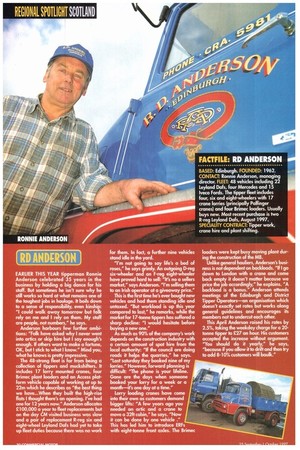(RD ANDERSON)
Page 32

If you've noticed an error in this article please click here to report it so we can fix it.
EARLIER THIS YEAR tipperman Ronnie Anderson celebrated 35 years in the business by holding a big dance for his staff. But sometimes he isn't sure why he still works so hard at what remains one of the toughest jobs in haulage. It boils down to a sense of responsibility, even kinship: "I could walk away tomorrow but folic rely on me and I rely on them. My staff are people, not numbers," he says.
Anderson harbours few further ambitions: "Folk have asked why I never went into artics or skip hire but I say enough's enough. If others want to make a fortune, OK, but I stick to what I know." Mind you, what he knows is pretty impressive. The 48-strong fleet is far from being a collection of tippers and muckshifters. It includes 17 lorry mounted cranes, four Brimec plant loaders and an Access platform vehicle capable of working at up to 22m which he describes as "the best thing we have...When they built the high-rise flats I thought there's an opening. I've had one for 12 years now." Anderson allocates 100,000 a year to fleet replacements but on the day CM visited business was slow and a pair of replacement R-reg six and eight-wheel Leyland Dafs had yet to take up fleet duties because there was no work for them. In fact, a further nine vehicles stand idle in the yard. "I'm not going to say life's a bed of roses," he says grimly. An outgoing Dreg six-wheeler and an F-reg eight-wheeler have proved hard to sell: "It's no a sellers market," says Anderson. "I'm selling them to an Irish operator at a giveaway price." This is the first time he's ever bought new vehicles and had them standing idle and untaxed. "But workload is up this year compared to last," he remarks, while the market for 17-tonne tippers has suffered a sharp decline: "I would hesitate before buying a new one." As much as 90% of the company's work depends on the construction industry with a certain amount of spot hire from the local authority: "If the council are doing roads it helps the quarries," he says. "Last saiurclay they booked nine of my lorries." However, forward planning is difficult: "The phone is your lifeline. Gone are the days when someone booked your lorry for a week or a month—it's one day at a time."
Lorry loading cranes have come into their own as customers demand bigger lifts: "A few years ago you needed an artic and a crane to move a 32ft cabin," he says. "Now it can be done by one vehicle ." This has led him to introduce ERFs with eight-tonne front axles. The Brimec loaders were kept busy moving plant during the construction of the M8. Unlike general hauliers, Anderson's business is not dependent on backloads. "If 190 down to London with a crane and come back empty it doesn't matter because we price the job accordingly," he explains. "A backload is a bonus." Anderson attends meetings of the Edinburgh and District Tipper Operators—an organisation which doesn't exactly set rates but works along general guidelines and encourages its members not to undercut each other.
This April Anderson raised his rates by 2.5%, taking the weekday charge for a 20tonne tipper to £27 an hour. His customers accepted the increase without argument. "You should do it yearly," he says, "because if you allow it to drift and then try to add 8-10% customers will baulk."
















































































































